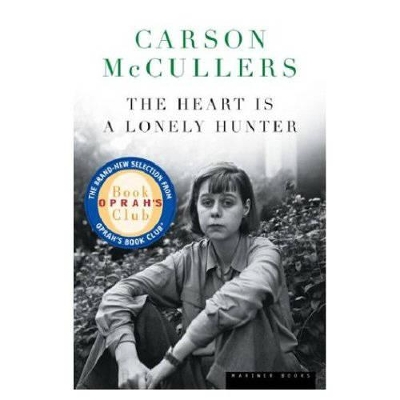Reviewed by brokentune on
The Heart is a Lonely Hunter is a work of true craftsmanship. The characters are well-appointed, the relationships between them are well structured. The themes and issues picked up by the book are not only conveyed in sympathetic manner, the fact that they are conveyed at all is an act of both foresight and courage.
The fact that Carson McCullers was only 23 when she wrote the book is astounding – and humbling.
McCullers throws us into the sweltering heat of summer in a small town in Georgia, where Mick Kelly is a tomboy on the cusp of growing up. One of things that set Mick apart from the other people around her is a love for music.
We also get to meet Mr Singer, a mute, who owns a radio, keeps himself to himself and focuses his life on his one friend – Mr Antonapoulos. This chosen retreat from society, from the people in the town has the remarkable consequence that the townspeople attribute Mr Singer with all sorts of rumours.
In a way, the character of Mr Singer, reminded me much of Brian in Monty Python’s story – where people would mistake the main character for the messiah and project their expectations on him.
Mr Singer really is the centre character that holds the story together. Through him we also meet Biff, the owner of the local all night cafe/bar, Jake, whose desire for social change leaves him mostly drunk, and Dr. Copeland.
Each of the characters has a story that is revealed. Each has hopes and dreams. Each is a representation of different minority groups of the time and at the time that the book was written. We are confronted with the violence against African Americans, the struggle of artistic young people who are pressured into mundane jobs, the idealists who are despairing over the lack of change.
The major turning point in the novel comes with the death of one of the characters. For the past few days I have been wondering if that death was meant to symbolise Nietzsche’s aphorism that God was dead. And in a way, this event does come close to it but that would presuppose that the events that follow this turning point were caused by or in any way influenced by that death. However, they are not. What follows the death of that character is merely the unravelling of the inevitable. In a way I understood this as a joke. As if to say, whether or not there is a God has no relevance on the suffering that is caused by humanity.
I did not love reading this book. I regard The Heart is a Lonely Hunter as a great and clever book, but it did not enjoy the act of reading as much as I hoped. For all its fabulous structure and courageous stances, I was not gripped by the writing. It is slow, languid, and perfectly at home in its southern setting, in contrast to which I am more at home with the few passages that contrast this.
“The silence in the room was deep as the night itself. Biff stood transfixed, lost in his meditations. Then suddenly he felt a quickening in him. His heart turned and he leaned his back against the counter for support. For in a swift radiance of illumination he saw a glimpse of human struggle and of valour. Of the endless fluid passage of humanity through endless time. And of those who labour and of those who – one word – love. His soul expanded. But for a moment only.”
Reading updates
- Started reading
- 5 March, 2015: Finished reading
- 5 March, 2015: Reviewed
